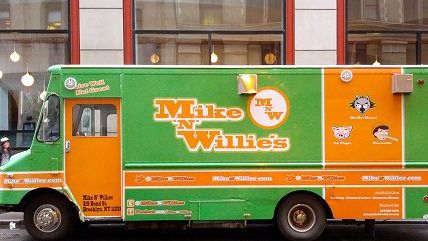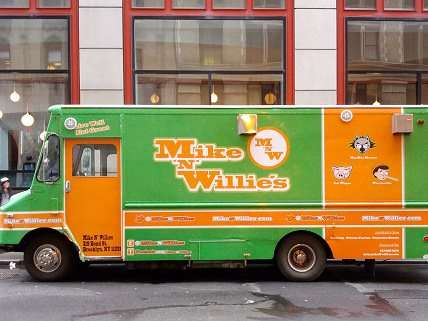Food Trucks Have Turned the Corner
Are we at the dawn of a new era for food trucks?


Food truck cuisine has often been about pushing boundaries. Think Korean tacos.
But how about a cannabis-infused food truck? Earlier this year, NPR reported on the THC-infused pulled-pork sandwiches cooked up by a Denver food truck.
Sound like a new era for food trucks? While cannabis carnitas may not be coming to a food truck near you anytime soon, I do think we've entered a new era in American food trucking.
I'm not sure when exactly it happened. No, it wasn't the John Favreau summer flick Chef, in which the actor portrays a principled chef who tells his boss (played by Dustin Hoffman) to shove it and opens up a food truck for the freedom it will give him to practice his art—while teaming up with an ex (played by Sofia Vergara) and friend (played by Scarlett Johansson). It wasn't even the film's surprisingly good reviews.
Maybe it's the appearance of a new nationwide food truck group. The National Food Truck Association, launched earlier this summer, seeks "to provide resources and support" to a segment of the food economy that's no longer "an underground and unseen industry."
If not the appearance of the group itself, maybe it was The New York Times profile of NFTA founder Matt Geller.
"If the group gains a foothold, it will signify the rapid evolution of the business from a quirky fad to a national industry with an estimated $1 billion in annual revenue and a growing political voice," wrote David Sax in the paper's dining section.
If not the NFTA and Times profile, it may have been the summer release of an Institute for Justice report on food trucks and food safety. It turns out, reports IJ, that food truck fare is as safe as the food sold by their brick-and-mortar counterparts.
That make sense. Each, after all, is subject to the same food safety rules and health inspections as the other.
The study, Street Eats, Safe Eats, compared health inspection reports from mobile vendors with those conducted at traditional restaurants.
But food trucks didn't just compete with brick-and-mortar restaurants. They excelled. The report found that "food trucks and carts did as well as or better than restaurants" in each of the seven major cities surveyed.
Not bad.
If it's not the film and the national association and Times profile and the glowing health inspections, maybe it's all those things in combination.
Or maybe it's that the regulatory tide that swamped food trucks appears to have turned for the better.
By my unscientific count, recent regulatory trends around the country actually appear to favor food trucks.
Some cities are more timid in deregulating than others. But for every bad rule you hear about—like this one and this one—it seems there are at least as many good ones popping up—as here and here.
There's also the fact that many in the media appear to have become educated enough about opposition to food trucks that they no longer regurgitate the baseless boilerplate of food truck opponents. In fact, newspapers often now leap to food trucks' defenses.
"We don't like the restrictions placed on food trucks… and we hope Ogden's council loosens them next year," wrote the editors of the Standard Examiner of Ogden, Utah, in a very good recent editorial that responded to some pretty lousy new rules. "We're of the opinion that more competition just maintains the high quality of food and drink offered."
Signals point to the fact that food trucks have turned a corner in this country. Whatever the reasons, that's good for American entrepreneurs and eaters alike.


Show Comments (28)